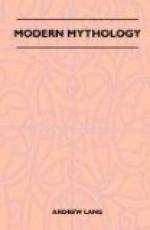Our little systems have their day,
They have their
day and cease to be,
They are but broken
lights from Thee,
And Thou, we trust, art more than
they.
But we need not hate each other for the sake of our little systems, like the grammarian who damned his rival’s soul for his ’theory of the irregular verbs.’ Nothing, I hope, is said here inconsistent with the highest esteem for Mr. Max Muller’s vast erudition, his enviable style, his unequalled contributions to scholarship, and his awakening of that interest in mythological science without which his adversaries would probably never have existed.
Most of Chapter XII. appeared in the ‘Contemporary Review,’ and most of Chapter XIII. in the ‘Princeton Review.’
REGENT MYTHOLOGY
Mythology in 1860-1880
Between 1860 and 1880, roughly speaking, English people interested in early myths and religions found the mythological theories of Professor Max Muller in possession of the field. These brilliant and attractive theories, taking them in the widest sense, were not, of course, peculiar to the Right Hon. Professor. In France, in Germany, in America, in Italy, many scholars agreed in his opinion that the science of language is the most potent spell for opening the secret chamber of mythology. But while these scholars worked on the same general principle as Mr. Max Muller, while they subjected the names of mythical beings—Zeus, Helen, Achilles, Athene—to philological analysis, and then explained the stories of gods and heroes by their interpretations of the meanings of their names, they arrived at all sorts of discordant results. Where Mr. Max Muller found a myth of the Sun or of the Dawn, these scholars were apt to see a myth of the wind, of the lightning, of the thunder-cloud, of the crepuscule, of the upper air, of what each of them pleased. But these




